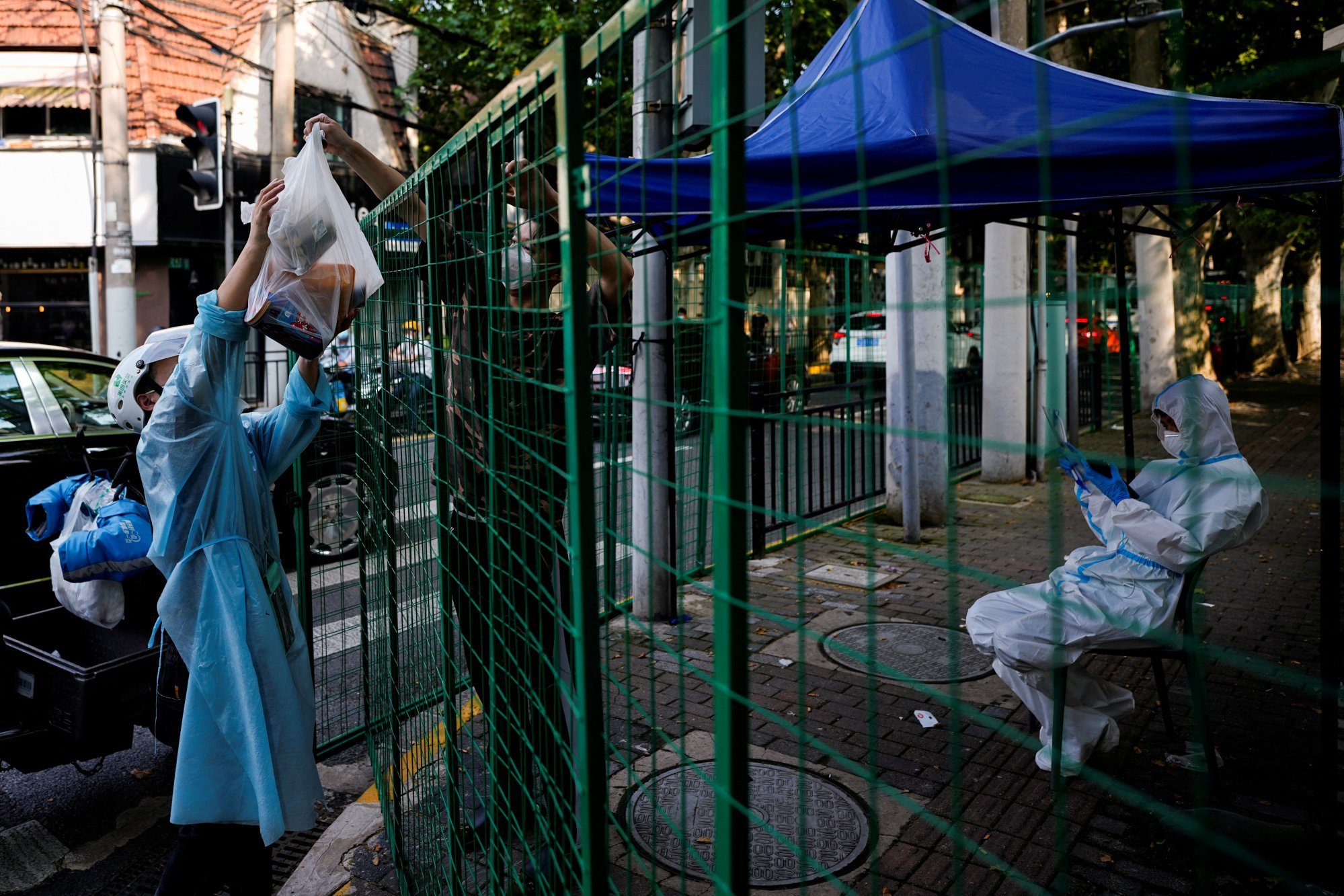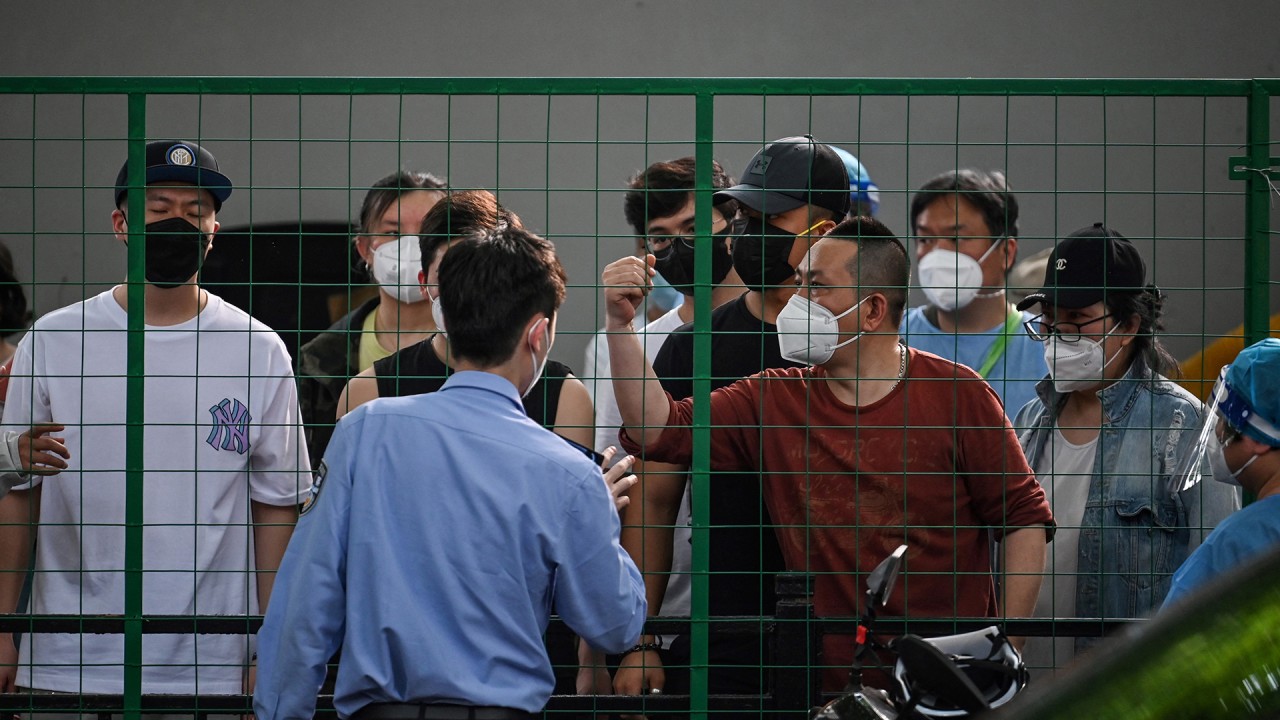
What next for China’s zero-Covid policy after Shanghai lockdown?
- Subtle changes have been introduced to prevent widespread closures but the reliance on PCR testing has huge costs
- Experts say the approach is financially unsustainable and there is also a possibility strict controls could become the new normal for society
To prevent another full-scale lockdown, the financial powerhouse is now banking on regular nucleic acid testing, sophisticated contact tracing – based on surveillance technologies and big data – and prompt, highly localised lockdowns when infections are found.
The Chinese authorities call the revised strategy “zero-Covid at the community level” and this refined approach appears to have helped Beijing avoid a citywide lockdown as well as enabling Shanghai to reopen, even as cases remained in its quarantined areas.
However, experts warn that a reliance on mass testing to curb Covid-19 transmission is unsustainable, both epidemiologically and financially, and may divert resources from better long-term strategies.
One expert also cautioned that the draconian measures used to curb infections could become permanent as a means of social control.
Tests after tests
While there was a sense of euphoria and relief among Shanghai’s residents as they came out of lockdown on June 1, Covid-19 continues to overshadow their lives.
Booths have been set up across the city, where they must queue for PCR tests almost every other day. And a positive result means the affected person’s entire residential complex will be sealed off.
The city government, on high alert after three community cases were found early this week, has warned residents to be vigilant or risk upending the results of the lockdown.
A video posted by news portal 163.com on Monday showed a Shanghai residential area sealed off by tall fences, just four days after they were removed, when a positive case was identified there.
Chen Xi, an associate professor with the Yale School of Public Health, said the strategy may hold off the virus for a while but is hardly sustainable.
“It may work in the short term to buy time to narrow the large immunity gap for the Chinese older population, improving short-staffed health infrastructure, etc,” he said.
“However, as virus transmissions become more rapid and asymptomatic, and new variants keep emerging, it is risky to rely on mass and frequent testing to keep up with fast and silent transmissions.”
No shift in China’s zero-Covid response until big picture changes: expert
Zhang Zuofeng, chair of the epidemiology department at the University of California’s Fielding School of Public Health, said PCR testing cannot be relied on to catch new infections quickly enough to prevent further outbreaks.
“Using PCR tests to identify original cases to eliminate Omicron infection is almost impossible, because the testing is behind the transmission curve, [and] slower than the Omicron transmission,” he said.
“Also, it is not so effective to rely on PCR testing for zero-Covid. When the testing volume is large, the false negative case number will also increase, which disturbs the efforts to quickly reach zero-Covid.”
Zhang said roughly the same results could be achieved with rapid antibody tests and recommended saving PCR testing for essential workers and medical staff, people with respiratory symptoms or those with positive rapid test results.

Huang Yanzhong, a senior fellow for global health at the Council on Foreign Relations in the US, said a report by Soochow Securities suggested regular PCR tests for China’s big cities were not financially sustainable.
According to estimates by Soochow Securities chief macro analyst Tao Chuan, a year’s mass testing for the roughly 505 million residents of China’s first and second-tier cities could top 1.7 trillion yuan (US$257 billion) – about 1.5 per cent of China’s 2021 GDP, or about 8.7 per cent of last year’s public fiscal revenue.
“If we agree with the Soochow Securities report … and if we include the cost of personnel, then it is going to be close to 2 trillion yuan. You could almost achieve free basic medical care for the entire nation … and the amount is even higher than military spending,” Huang said.
China spent 2.33 trillion yuan (US$300 billion) on basic medical care from its medical insurance scheme in 2019. Meanwhile, China also set aside 1.45 trillion yuan (US$230 billion) on its defence budget this year, the National People’s Congress was told in March.
How the economic slowdown and zero-Covid threaten China’s global plans
Huang said the expanding costs might be behind Beijing’s recent order to local governments to stop using medical insurance funds to cover the expenses for regular PCR tests, to prevent their rapid depletion.
According to a report by online news portal The Paper, Shanghai spent 120 million yuan (US$18 million) from its health insurance funds up to August 2021 on PCR and antigen tests.
But moving the burden from insurance funds to local governments could affect the quality of testing, as local authorities squeeze the costs from service and product providers to protect their own coffers.
In late May, Beijing’s municipal government had to talk to all its PCR test providers after discovering one of them was diluting samples to save costs.
Why insist?
The Chinese government has repeatedly said the zero-Covid policy is the only way to protect people’s lives, partly because many elderly Chinese were not fully vaccinated, but also because of the huge disparities in healthcare capacity between different localities.
Ironically, by pouring resources into PCR testing, the Chinese government’s ability to strengthen vaccination rates could be undermined, along with the resilience of its healthcare system, analysts said.
“Health systems were understaffed even before the pandemic, and more of them now devote themselves to mass testing, leaving even fewer health professionals to vaccinate the population,” Chen said.
“Also, the ever increasing power of the PCR industry could block all efforts that strive for a more sustainable strategy against Covid-19, such as vaccinating vulnerable populations. More corruption cases associated with PCR testing are likely to emerge as a result.”
The Chinese government has tried to plug the gaps with plans for dedicated teams to conduct regular PCR tests, and is stepping up vaccination of the older population.
By early June, more than 218 million people aged 60 or above – nearly 83 per cent of the elderly cohort – had received two shots, and 169 million of those have now received a third dose, according to state news agency Xinhua.
But Huang said Beijing may be reluctant to relax the current control measures, even if most the country’s vulnerable population is vaccinated, because of political concerns.
He pointed out that China had criticised Covid-19 policies in Western countries because of the large number of deaths which had resulted and highlighted the superiority of the Chinese political system, which is able to pull resources nationwide for a single cause.
Shanghai outbreak exposes Chinese health system’s fragility
“If you move away from an approach, basically you are admitting failures and that’s not politically acceptable, especially before the 20th Communist Party congress, not to mention this was portrayed as a competition between two political systems. You still want to claim the superiority of this political system,” he said.
Huang cautioned that it would be extremely difficult to remove the daily routines of PCR tests, quarantine and small-scale lockdowns once they become institutionalised.
“This is what we call the stickiness of the policy. Like the Family Planning Commission, which was institutionalised at each level, it will be very difficult to get rid of,” he said.
The measures could also become convenient tools of social control, giving the government even more incentive to keep them permanently, he added.
Official defends China’s zero-Covid policy amid calls for it to be eased
“Zero-Covid is like a proof of concept for hi-tech measures and interventions. It proves measures like the health code and the PCR test codes can be effectively used to monitor people on a daily basis,” Huang said.
“So, it is possible that even after the pandemic, some of the measures will continue to be used by the state for social control and may become like a new normal.”
Analysts said the window for zero-Covid is closing and the government needs to formulate an exit strategy by strengthening healthcare infrastructure and vaccination programmes, as well as accelerating the development and approval of vaccines.
But before that, more cities will be locked down to keep new outbreaks at bay, although the authorities may have learned from Shanghai’s experience and avoid food shortages and other problems.
“Lockdown of major cities will probably happen again, but I think they will try to learn the lessons from Shanghai, Beijing and elsewhere to secure daily necessities and financial aid to sectors hit harder by lockdowns,” Chen said.



_1.jpg?itok=FxuA75op)